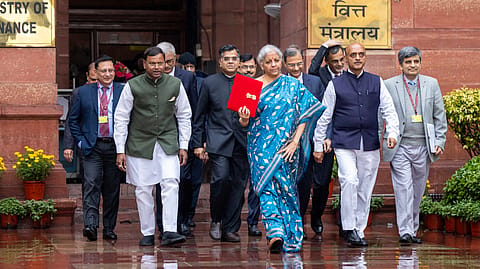Budget 2024: What salaried class should expect from FM’s speech
Govt may aim for measures to improve consumption in the near term; further reforms on the taxation front likely

Finance Minister Nirmala Sitharaman, in her final budget speech of the Modi 2.0 government on February 1, 2024, may certainly not disappoint salaried or individual taxpayers, especially because of the upcoming Lok Sabha polls in April-May 2024.
They form a significant chunk of the voter base and it's in the government's interest to provide relief to this particular section, suggest analysts.
Since the cut in corporate income tax rate in September 2019, there has been a continuous demand to reduce personal income tax rates as well. “The new tax regime can be made more attractive by either increasing the exemption income limit, raising the income tax rebate under Section 87A or by reducing the highest surcharge rate; and ) some incentives to further boost the residential or commercial property market,” writes Motilal Oswal's research analysts Nikhil Gupta and Tanisha Ladha in the brokerage's "Ecoscope" report.
PNP Paribas-led Sharekhan in its pre-budget analysis says in Interim Budget 2024 the government may take some “adequate measures” to improve consumption in the near term. “To increase the income in the hands of salaried people, the government might provide some interim tax relief by increasing the standard deduction limit from the current Rs. 50,000 (not changed for last five years).”
However, the brokerage thinks with the recent triumph in state elections, the upcoming Interim Budget for 2024 appears to steer clear of grand “populist gestures”. Instead, the focus may likely be on maintaining the status quo with a keen eye on policy continuity. “Recognising the need to kickstart demand in both the rural and urban landscapes, the Budget might unveil a few sops, like potential tweaks in tax slabs and enticing incentives aimed at reviving economic activity, especially in the rural economy.”
Other demands on personal taxation fronts include ease of tax payments or obligations for non-residents, including enabling tax payments from overseas bank accounts; e-verification using OTPs to foreign mobile numbers; tax refund to overseas bank accounts; and enhancements to the Annual Information Statement (AIS).
Some say the new tax regime can also be made more attractive, either by increasing the exemption income limit, raising the income tax rebate under Section 87A or reducing the highest surcharge rate.
Recommended Stories
Notably, FM Sitharaman in her last year's budget had proposed to extend the benefit of the standard deduction to the new tax regime. "Each salaried person with an income of Rs 15.5 lakh or more will thus stand to benefit by Rs 52,500," the FM had said.
The FM had also provided relief to those with income up to Rs 5 lakh, exempting them from paying any income tax in both old and new tax regimes. For middle-class individuals, the FM had reduced the number of slabs to five and increased the tax exemption limit to Rs 3 lakh.
The government had also announced relief on the personal income tax front by reducing the highest surcharge rate from 37% to 25% in the new tax regime. In line with the increase in government salaries, the Centre had also increased the limit on leave encashment on the retirement of non-government salaried employees to Rs 25 lakh.